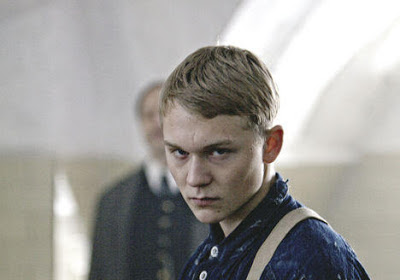One thing you humans are known throughout the universe for is your depressing Oscar-bait movies. Every year a cavalcade of films come out with a horde of talented actors playing tragic heroes and historical figures. All of these have huge production values and an easily digestible plot with nothing to encourage audiences to think.
That chubby office manager who somehow made his way into Hollywood once wrote a line for Kate Winslet: "I don't think we need another film about the Holocaust, do we? It's like, how many have there been? No, we get it, it was grim, move on. No, I'm doing this because I've noticed that if you do a film about the Holocaust, guaranteed an Oscar. I've been nominated four times. Never won. The whole world is going, 'why hasn't Winslet won one?'"
Generally, Gort and I like to use these droning, depressing, historical epics as target practice; firing them from the Mothership's airlocks and sniping at them with the turbo lasers (our apologies to Finland for that wild shot that took out your eastern seaboard). You may think we're a little harsh, but the simple truth is that these kind of movies do not have to be mind-numbing, they can make you think. Take Norwegian movie The King of Devil's Island...
The first question to ask about this movie is what exactly it has to do with the Devil. The island in question is never referred to as Devil's Island and is instead a place called Bastoy. We fear the change of title is an attempt to appeal to audiences who would be put off by the Norwegian name. The real-life Bastoy island has been a prison camp for young offenders for over a century. Nowadays, it is quite reputable and progressive, but in 1915 it was a nightmare for the juvenile prisoners, who eventually revolted and overthrew their jailors.
Dramatising this story, the film opens with the arrival of a teenage sailor, imprisoned for murder. His thoughts are initially only of escape, but as a friendship grows between him and a privileged, exemplary prisoner, the two begin to watch over the other inmates. When an abusive jailor causes the tragic death of a vulnerable cell-mate, the situation becomes a powder keg.
Opposing the two leaders of the prisoners is strict warden Stellan Skarsgard, who stamps his presence over the film, despite not featuring heavily, by performing with the flexibility that allows him to appear in both dogme and this year's top blockbuster with equal aplomb. The warden genuinely cares about the children in his care and believes that those who survive Bastoy leave with the only chance at a decent life they will ever get. Despite being horrified by the actions of his staff, he is forced to support them in order to avoid derailing his charges' rehabilitation.
The stand-offs between Skarsgard and the sailor are fraught with moral tension - rail against an immoral system and sacrifice what little good it may be doing or defend it and prosper, while sacrificing your ethics. The film doesn't offer any easy answers, particularly when the young sailor's friend is mere weeks from parole, but only if he doesn't rock the boat.
The plot grinds along on a slow boil, but is economical enough to make every single second inform character and drive the story. Atmospheric direction and excellent performances make for an intense experience while the narrative manages to draw you into the moral quandary without ever having to state either case or take sides, even for a moment. If only the Academy took more notice of that kind of effort, instead of high budget and no substance.
The King of Devil's Island is released on all formats on 29th October.






